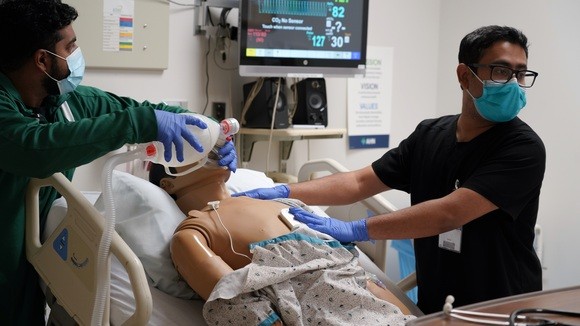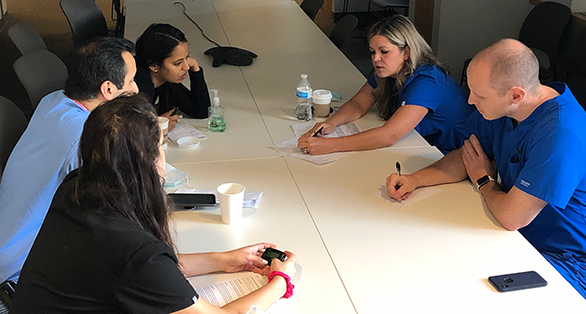Fellows will be accepted into the combined track, with some critical care training integrated into their first two years of their respective subspecialty. In the PGY-6 year, there will be a heavy focus on pure critical care training encompassing all aspects of intensive care medicine.

|
PGY-4 |
PGY-5 |
PGY-6 |
|
|---|---|---|---|
|
Medical ICU |
2 blocks |
5 blocks |
|
|
Cardiovascular/ Thoracic ICU |
|
2 blocks |
|
|
Trauma ICU |
1 block |
||
|
Neurosurgical ICU |
1 block |
||
|
CCU |
1 block |
||
|
Anesthesiology |
2 weeks |
1 block |
|
|
Elective |
1 block |
||
|
Nephrology/ ID Consults |
1 block |
||
Each fellow will participate in:
In addition, the Critical Care Track Fellows will be required to attend key lectures, MICU orientation, ventilator training and buddy calls.
Medical ICU - Each fellow will have 6 months of MICU training, which encompass all aspects of critical care, including ARDS, PE, shock, respiratory failure, upper
and lower GI bleeds, liver failure, hematological/oncological emergencies,
toxic and metabolic disorders, and renal disorders. During these months,
fellows will learn conventional and unconventional modes of mechanical ventilation including, Bilevel, APRV, and PAV. As the fellow progresses their role will
become that of a Junior Attending leading MICU team rounds, rounding with a
physician extender, and reviewing plans with the attending physician. This
graduated responsibility provides the fellow more autonomous growth and
confidence in handling an ICU upon graduation.
Trauma- Fellows will rotate through our Trauma Unit which is a Level One Trauma
Center. Fellows will learn primary and secondary surveys, respond to trauma codes with the trauma team, participate and lead trauma rounds, and perform critical care procedures.
Cardiovascular/thoracic ICU rotation - Fellows will gain experience with VA and VV ECMO, pulmonary artery catheters, mechanical devices, post-operative care of cardiothoracic patients, and the management of those patients admitted to the intensive care unit following coronary artery bypass graft surgery, valvular heart surgery, thoracic surgery, and solid organ transplant.
Neurosurgical ICU – AGH is a comprehensive stroke center and has a robust neurosurgical service. 6 of our current faculty members are also board-certified in Neuro-critical Care. The fellow will rotate daily with the neurosurgical and neurology team.
This rotation allows the fellow to gain airway skills in the non-emergent setting. Skills include bag mask ventilation, LMA insertion, and endotracheal intubation with direct laryngoscopy and glidescope.

For further information regarding our critical care track please see the attached curriculum and visit their web site for further details for applying.